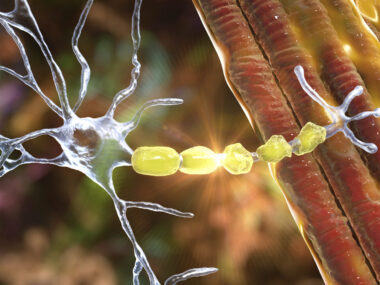Neurologist wins Dystel Prize for research on immune cells in MS
Penn Medicine professor awarded $40K for work into disease mechanisms
Written by |

A researcher and neurologist at Penn Medicine in Philadelphia has won the 2025 John Dystel Prize for Multiple Sclerosis Research for his work in uncovering immune mechanisms of multiple sclerosis (MS), identifying disease biomarkers, and finding new avenues toward tailored medicine.
The prize comes with a sculpture and $40,000, “to be used at the recipient’s discretion,” according to a press release from the National Multiple Sclerosis Society, which jointly awarded the honor with the American Academy of Neurology (AAN).
To be awarded April 8, at the AAN 2025 annual meeting in San Diego, the prize this year goes to Amit Bar-Or, MD, a professor of neurology at the University of Pennsylvania and chief of the division of MS and related disorders. He’ll deliver his Dystel Prize lecture on the same day, per the release.
“Dr. Bar-Or has been a key player in shaping the evolving conceptual framework of MS, including how the field thinks about early diagnosis, disease mechanisms, effective treatment, and stopping disease progression,” said Bruce Bebo, PhD, executive vice president of research at the National MS Society.
Bar-Or said he is “deeply [honored]” to be awarded the Dystel Prize this year.
“There is nothing more gratifying than being recognized by one’s peers — which at least suggests our work is on the right track, as part of international efforts by multiple groups aimed at further elucidating MS disease mechanisms and optimizing care for individuals living with MS,” Bar-Or said.
Scientist’s research into MS has contributed to new treatments
As part of his research journey, Bar-Or has advanced the understanding of how B-cells — the immune cells responsible for producing antibodies — drive other immune cells to damage the myelin sheath that covers nerve cells in the brain and spinal cord. That damage ultimately results in MS.
Research on B-cells paved the way for many of the disease-modifying therapies used today to reduce disease activity and slow the accumulation of disability in MS. Bar-Or also helped determine the mechanism of action for approved medications and experimental ones, like Bruton’s tyrosine kinase inhibitors, now in Phase 3 clinical testing, according to the release.
David Hafler, MD, a professor at Yale School of Medicine and winner of the 2010 John Dystel Prize, said Bar-Or “has made seminal discoveries.” Hafler, who nominated Bar-Or for the award, added that “his involvement in clinical trial programs and translational work has led to B-cell therapies that have been transformative in the treatment of MS.”
[Bar-Or’s] contributions to neuroimmunology, precision medicine, and biomarker studies have a direct impact on the treatment of people with MS, and I am excited to see his research continue to inform how to stop disease progression and ultimately end MS.
In addition to his work on B-cells, Bar-Or has developed a precision neuroimmunology platform to group patients based on their immune cell responses. This work could help doctors decide on the best course of treatment — for instance, selecting the best approach for newly diagnosed patients or determining whether or not to stop treatment for individuals experiencing stable disease.
Bar-Or’s research also resulted in the identification of biomarkers of MS in the blood and cerebrospinal fluid, which is the liquid flowing around the brain and spinal cord. Biomarkers can be used for more accurate diagnosis or to predict how quickly the disease will progress or how patients will respond to treatment.
According to Bebo, the researcher’s “contributions to neuroimmunology, precision medicine, and biomarker studies have a direct impact on the treatment of people with MS, and I am excited to see his research continue to inform how to stop disease progression and ultimately end MS.”
Bar-Or had previously been recognized by the National MS Society for his work in understanding how the immune response contributes to MS. For that work, he was awarded the international 2021 Barancik Prize for Innovation in MS Research.



